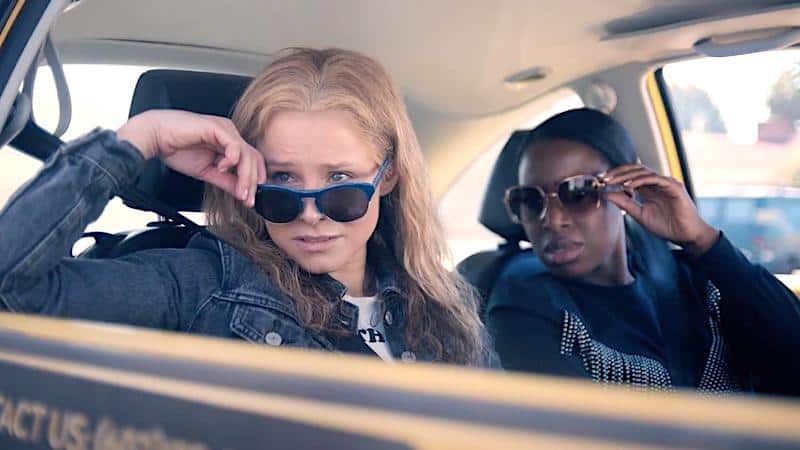Real Stories is an ongoing column about the true stories behind movies and TV shows. It’s that simple. This installment focuses on the true story behind the crime comedy Queenpins.
Two women create a $40 million coupon scam. That is the basic premise of Queenpins, a comedy reuniting The Good Place co-stars Kristen Bell and Kirby Howell-Baptiste as the two leads. On the case to bust them: a supermarket’s loss-prevention officer and a US postal inspector, played by Paul Walter Hauser and Vince Vaughn, respectively.
Despite the absurdity of the synopsis, believe it or not, Queenpins is based on a true story. Talk about extreme couponing!
Here’s what really happened:
Millions of Dollars in Coupons
Details of the true story at the heart of Queenpins were first revealed in July 2012. Police in Phoenix, Arizona, announced the arrest of three women after they confiscated more than $25 million worth of fake coupons in a raid. Authorities also seized twenty-two assault weapons and twenty-one vehicles, including a forty-foot boat, in the raid. The fake coupon game isn’t a joke.
One local law enforcement official at the time told the news:
“The opulence and the money was the equivalent of drug cartel-type of stuff. That’s the type of money they had.”
While the movie is focused on two women, there were three at the heart of the real coupon ring. Then-forty-year-old Robin Ramirez led the group, which included Marilyn Johnson, then-fifty-four, and Amiko “Amy” Fountain, then-forty-two.
How the Real Queenpins Counterfeit Scheme Worked
Here’s how the real Queenpins counterfeit coupon ring worked: shoppers would purchase the coupons on websites like eBay and/or be invited or referred to the ring’s personal website, savvyshoppersite.com. Once there, buyers would have access to an array of high-dollar coupons.
According to KTAR News, a Phoenix radio station, the group focused on manufacturers’ coupons, which typically offer a free item or significant discount. As one law enforcement official put it, these were not the “fifty-cents-off coupons” one might find in their mailbox. The women guaranteed a one-hundred-percent return rate if a store rejected one of their coupons. Had their deals been a little worse, maybe the women would have never gotten caught.
The scheme came crashing down after forty businesses, including major companies like Proctor & Gamble, Hershey, and PepsiCo, filed fraud complaints. After tracing the origins of the ring to Phoenix, the FBI then teamed up with local law enforcement to bust the group. According to Time magazine, they went undercover and purchased coupons as part of their effort to locate the source.
The ring used a series of twelve different bank accounts to house their money. One account had more than $2 million dollars. Authorities eventually traced Ramirez’s activity back to 2007.
Everybody Loses
In the wake of the bust, all three women pleaded guilty. Fountain and Johnson each pleaded guilty to one charge of counterfeiting. Ramirez pleaded guilty to counterfeiting, fraud, and illegal control of an enterprise. A judge sentenced Ramirez to twenty-four months in prison and seven years probation. They were also ordered to pay Proctor & Gamble more than $1.2 million. Authorities later estimated that the coupon ring cost corporations hundreds of millions of dollars in profit.
But let’s be honest: it’s hard to feel too sorry for the corporations in this instance. And it seems like the makers of the movie share this sentiment. The trailer for Queenpins includes audio of Bell and Howell-Baptiste’s characters calling out systemic inequality and likening themselves to Robin Hood. Of course, the trailer also shows them later living in luxury and boarding private jets. I’ll go out on a limb here and predict that their once noble intentions go off the rails.
As the Time article notes, couponing became popular not only in the wake of reality television shows like TLC’s Extreme Couponing but also due to the economic reality in the wake of the Great Recession. And it does seem like Queenpins will take a comedic look at the inequality underpinning the counterfeit coupon market. No one who purchased coupons faced legal repercussions, but one can’t help but think that they are the real losers here. Goodbye coupons, hello high prices. Capitalism always knows how to win.
Queenpins hits theaters on September 10th and will be available to stream via Paramount+ on September 30th.

